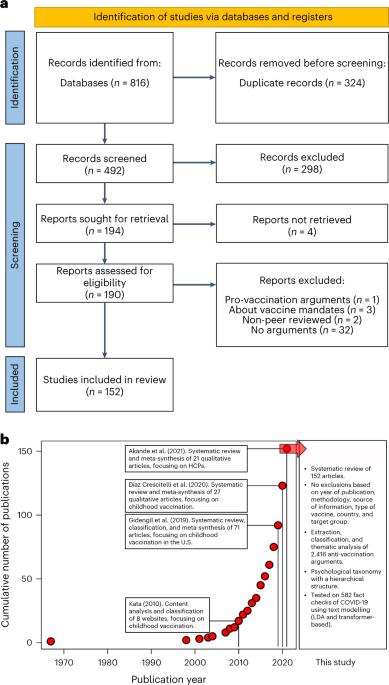来自系统文献综述和文本建模的反疫苗接种论点的分类。
IF 21.4
1区 心理学
Q1 MULTIDISCIPLINARY SCIENCES
引用次数: 4
摘要
反疫苗接种论调的泛滥对许多免疫方案的成功构成威胁。有效反驳反向论点需要一种方法,不仅要解决论点中的缺陷,还要考虑态度根源,即驱动一个人反对疫苗信念的潜在心理特征。在这里,通过对152篇科学文章的预先注册的系统文献综述和对反疫苗接种论点的主题分析,我们开发了一个层次分类法,将常见论点和主题与11个态度根源联系起来,解释了为什么个人可能表示反对接种疫苗。我们通过使用自然语言处理算法将人类编码和机器学习相结合,进一步验证了我们对2019冠状病毒病反疫苗接种错误信息的分类。总的来说,该分类法是一个理论框架,将表达的对疫苗的反对与其潜在的心理过程联系起来。这使得未来的工作能够制定有针对性的反驳和其他干预措施,以解决反疫苗接种争论的根本动机。本文章由计算机程序翻译,如有差异,请以英文原文为准。

A taxonomy of anti-vaccination arguments from a systematic literature review and text modelling
The proliferation of anti-vaccination arguments is a threat to the success of many immunization programmes. Effective rebuttal of contrarian arguments requires an approach that goes beyond addressing flaws in the arguments, by also considering the attitude roots—that is, the underlying psychological attributes driving a person’s belief—of opposition to vaccines. Here, through a pre-registered systematic literature review of 152 scientific articles and thematic analysis of anti-vaccination arguments, we developed a hierarchical taxonomy that relates common arguments and themes to 11 attitude roots that explain why an individual might express opposition to vaccination. We further validated our taxonomy on coronavirus disease 2019 anti-vaccination misinformation, through a combination of human coding and machine learning using natural language processing algorithms. Overall, the taxonomy serves as a theoretical framework to link expressed opposition of vaccines to their underlying psychological processes. This enables future work to develop targeted rebuttals and other interventions that address the underlying motives of anti-vaccination arguments. Angelo Fasce et al. conducted a systematic literature review and applied natural language processing methods to develop a taxonomy that relates anti-vaccination arguments to their psychological roots.
求助全文
通过发布文献求助,成功后即可免费获取论文全文。
去求助
来源期刊

Nature Human Behaviour
Psychology-Social Psychology
CiteScore
36.80
自引率
1.00%
发文量
227
期刊介绍:
Nature Human Behaviour is a journal that focuses on publishing research of outstanding significance into any aspect of human behavior.The research can cover various areas such as psychological, biological, and social bases of human behavior.It also includes the study of origins, development, and disorders related to human behavior.The primary aim of the journal is to increase the visibility of research in the field and enhance its societal reach and impact.
 求助内容:
求助内容: 应助结果提醒方式:
应助结果提醒方式:


